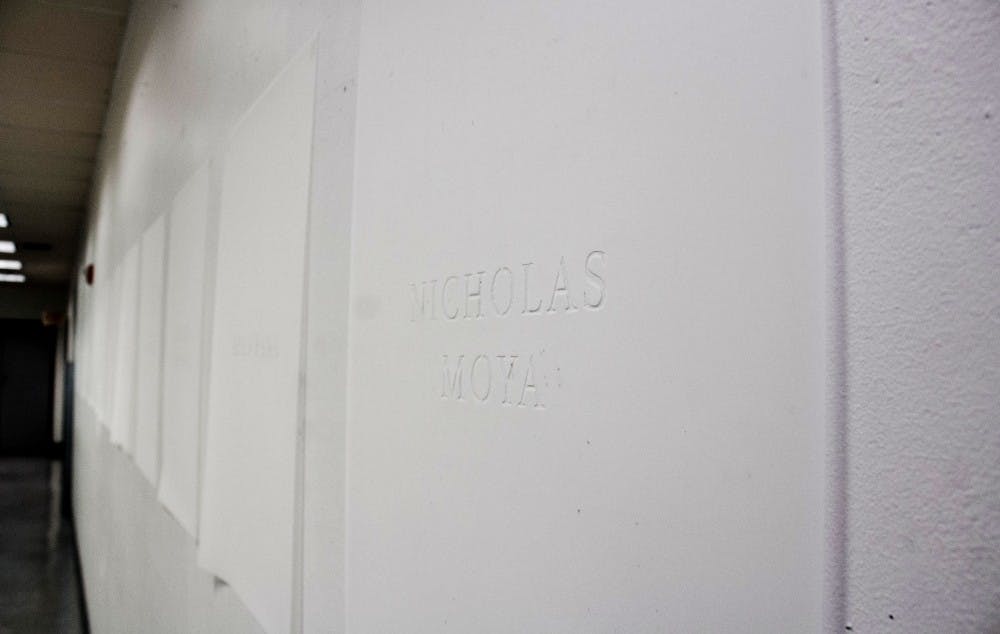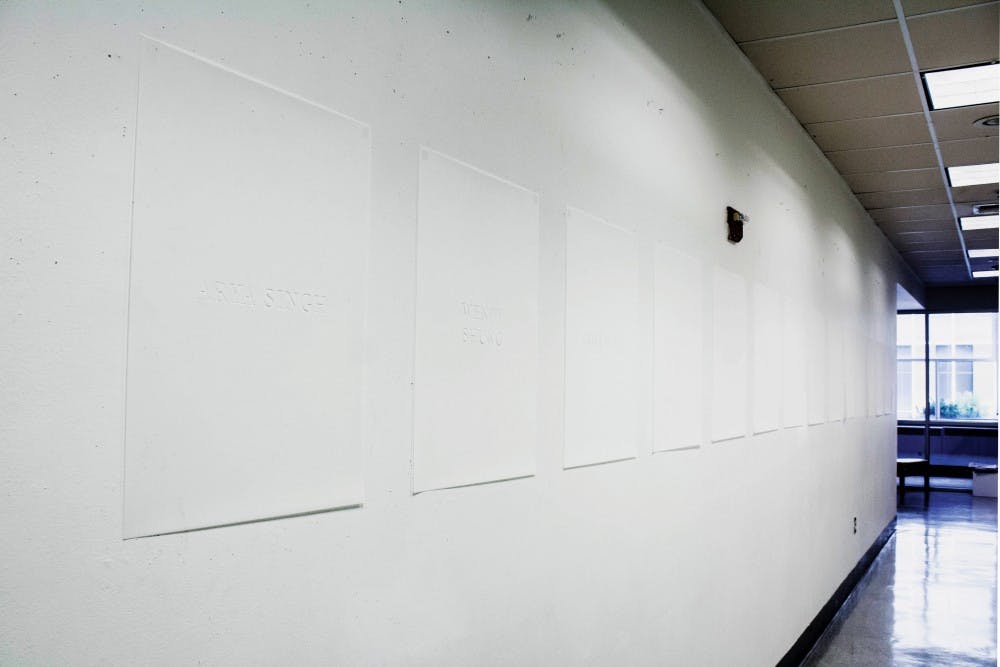
Photo from Kate Jeon
Students walking through the first-floor hallway of Charles Addams Fine Arts Hall this week might find themselves distracted by a series of thin, barely perceptible white posters. When someone rushes by too quickly, the bottom corners of these posters lift, casting a shadow against the white wall that makes it just possible to see the words that have been laser cut onto the Mylar sheets.
“ARYA SINGH,” reads the first poster on the left. Twelve other names are printed on each sheet before the very last one on the right, which reads: “NICHOLAS MOYA.” Together, these are the names of the 14 Penn students who have died by suicide since February 2013.
The posters, which are part of an exhibit titled “We Are for Each Other,” were designed by College senior Kate Jeon for the class "Advanced Design and Typography," Fine Arts 370.
Jeon’s project calls on students to pay closer attention to those around them with the goal of improving the culture of mental wellness at Penn. But her project, and the process that led her to install it in Addams instead of a more public space, has also raised complex questions for how mental health can and should be discussed on campus.
Jeon, who felt motivated to produce the project a week after Moya's death on Aug. 31, said the subtlety of the exhibit was deliberate.
“If you see this from far away, you don’t really see the names at all,” said Jeon, who is a former Daily Pennsylvanian design editor. “You have to pause, and take the time to really look at it to notice the names. That’s the metaphor I was going for.”
David Comberg, a fine arts lecturer and Jeon's instructor for the course, said he appreciates that her project articulates a personal message.
"She's trying to reach out, to say, 'look at your friends, really look at your friends,'" Comberg said. "Try to be conscious that a friend can be a helpful person. It doesn't have to be a professional."

Photo from Kate Jeon
Jeon initially wanted to stage her exhibition on a series of panels outside the Annenberg Center, facing Walnut Street, but her request to do so was rejected on Sept. 15 by Kelly Fernández, the Executive Assistant to the Dean of the Annenberg School for Communication. Jeon altered her proposal to include just the dates of the students’ deaths rather than their names, but was rejected again by Fernández, who directed her to Counseling and Psychological Services Director Bill Alexander for more information.
Alexander confirmed in an email that he had a “positive conversation” with Jeon but did not address specific inquiries on why Jeon’s request was rejected, or whether the University has a standardized policy on discussing mental health issues in a public forum.
“When the Annenberg School was approached about displaying the art project in a very public space, we were concerned about its sensitive nature and so sought advice from VPUL,” Annenberg School Dean Michael Delli Carpini said in an emailed statement. “Based on what we learned regarding both issues of privacy and the possibility of unintentionally triggering potentially dangerous emotional and physical responses, we decided to err on the side of caution.”
President of Active Minds and College junior Vivian Dai raised similar concerns when Jeon first approached her for advice on the project.
“I was reminded of the suicide cluster effect, and that became my main concern,” Dai said, referencing studies that have found that suicide rates can rise following an increase in public stories on suicide. “Part of [what causes that effect] is because people who are already suffering from depression, considering the option of suicide, then see it as more of an option.”

Photo from Kate Jeon
Anneberg's rejection of Jeon’s request, along with other considerations, ultimately led Jeon to move the installation to inside Addams.
But Dai, Jeon and Comberg all said that there have been limitations to this compromise.
“I wish it was in a space that was more public. On this wall, the audience is kind of limited to just Fine Arts students,” Jeon said. She added that when she discussed the project with her classmates and friends, all of them seemed to express a desire for more honest and open dialogue on mental health at Penn.
Comberg agreed. “Everyone [in the class] was very touched and wanted to see it done publicly,” he said. “Everyone wanted to see more done by the University. Instead of sending out a list of helplines or websites, that maybe the University should address this in a more serious way somehow.”
Dai said that while she believes the issue of student suicides is kept “hush-hush” by both students and administrators, she thinks increasing dialogue on the topic has to be done carefully.
“This is just a really tricky line to toe, so whenever we talk about suicide, we try to steer people towards the solution,” Dai said.
“The administration has never really talked specifically about student deaths, or that it’s very specific to Penn that there have been so many. I think they could definitely do better in that regard, but I think they’re trying to be very careful now, and I'm not sure I blame them,” she added.
Jeon’s exhibit will be available in Addams until the end of the week.
CAMPUS RESOURCES
The HELP Line: 215-898-HELP
Counseling and Psychological Services: 215-898-7021 (active 24/7)
Student Health Service: 215-746-3535
Wellness Resources
Office of the Vice Provost for University Life: 215-898-6081
University Chaplain’s Office: 215-898-8456
Reach-A-Peer Helpline
- 215-573-2727 (every day from 9 p.m. to 1 a.m.)
- 215-515-7332 (texting service available 24/7)
- Letter-writing service
Penn Benjamins (in-person peer counseling)
- Su, M, T 8-11 p.m. Harnwell Library First Floor
- W, Tr 8-11 p.m. Houston Hall Chaplains Office
The Daily Pennsylvanian is an independent, student-run newspaper. Please consider making a donation to support the coverage that shapes the University. Your generosity ensures a future of strong journalism at Penn.
Donate






